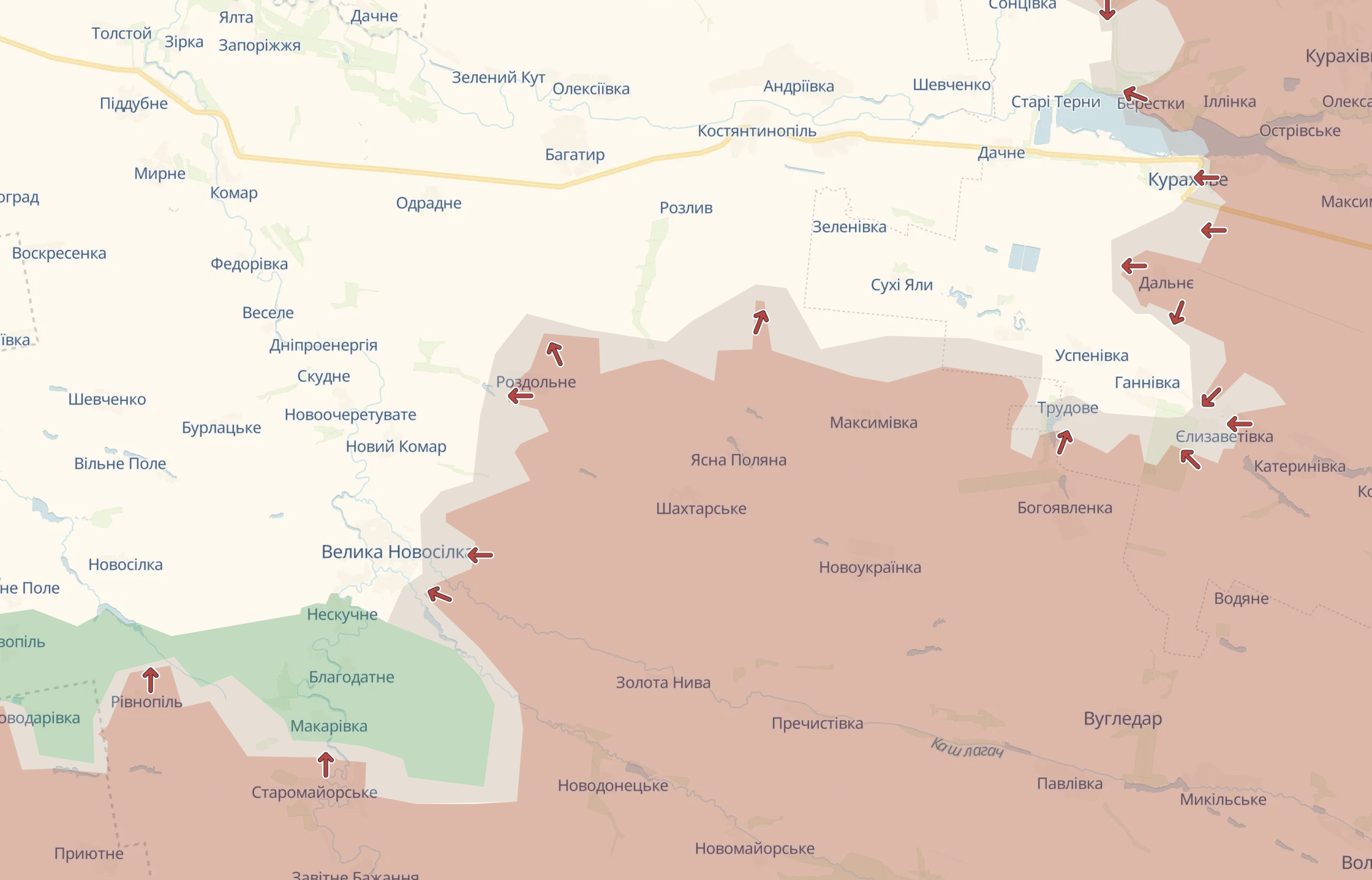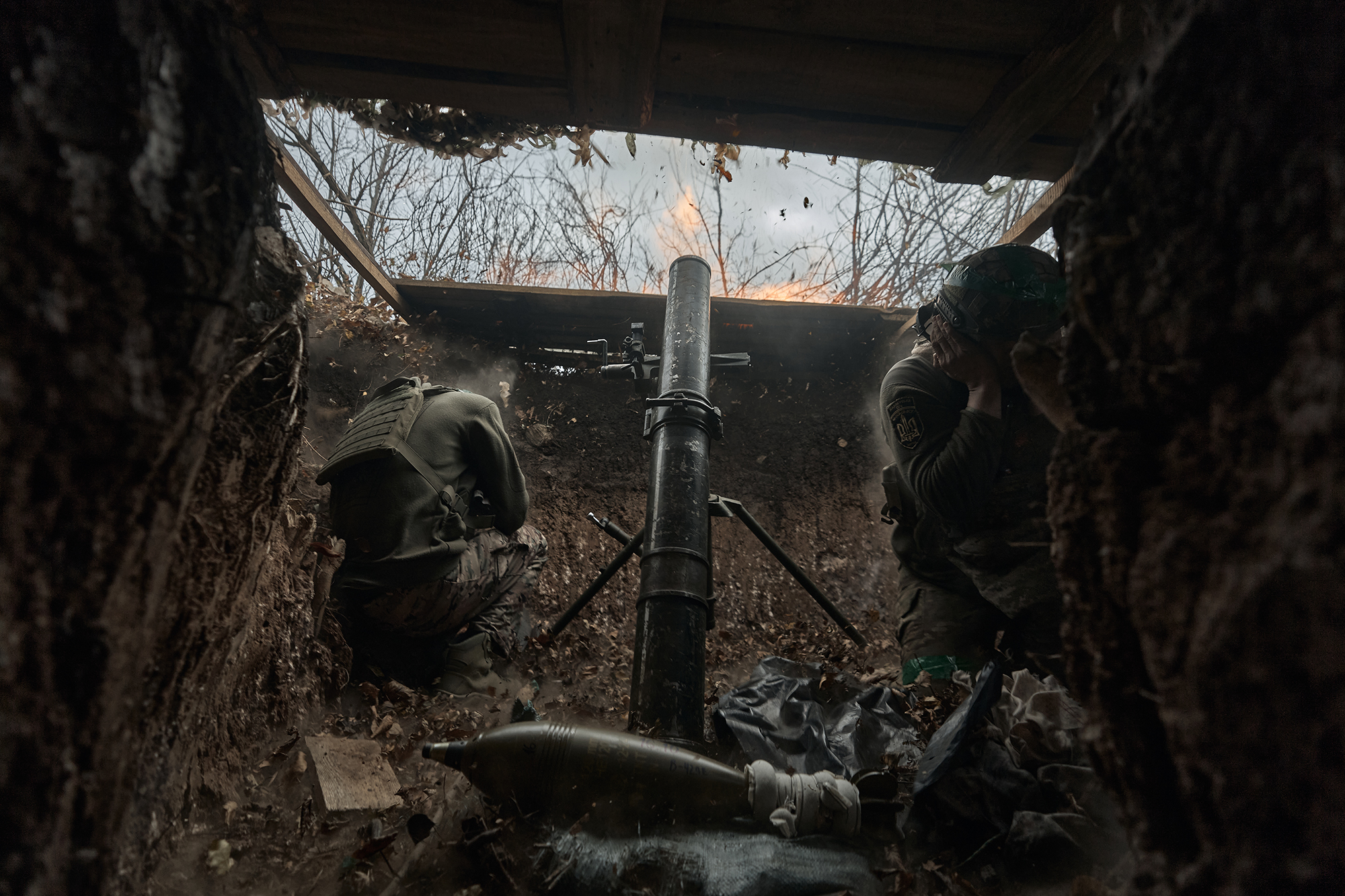Russia is preparing an offensive in Kherson and Zaporizhia. What’s happening at the front and what are Putin’s plans?
Russia is continuing its offensive across various sectors along the entire Eastern Front. At the same time, Moscow is preparing to ramp up activity in the South. What is happening on the battlefield and what are Putin's plans - in the material by military-political observer of RBC-Ukraine, Ulyana Bezpal'ko.
Ukrainian forces are struggling to halt the Russian offensive campaign at the front. The pace of the enemy's advance this autumn is comparable only to the first half of 2022. Moscow's goal is to achieve maximum territorial gains and complicate Ukraine's position as much as possible before the inauguration of President Trump.
Currently, the enemy is pressing on seven fronts and has engaged in battles for three Ukrainian defense hubs in the East – Chasiv Yar, Kurakhove, and Velyka Novosilka.
Simultaneously, the aggressor intends to intensify operations in two additional areas in the South, where relative stability has been maintained for over a year.
Southern Donbas
The epicenter of the fighting in the East is the area around Kurakhove. Occupants are advancing on this crucial logistics hub in the southern Donetsk region from the north (GV "Center"), east (GV "South"), and south (GV "East"). From the north, enemy troops are moving towards the western part of the Kurakhiv Reservoir – from Berestkove, Voznesenke, and Solntseve. From the east – from Maksymilyanivka – towards the central streets of the city.
From the south, the enemy is advancing from Uladivka with several groupings – towards the river Sukhi Yaly. Ukrainian positions in this area are complicated by the fact that the enemy has simultaneously broken through from Maksymilyanivka into the village of Dal'ne, thus reaching the rear of our grouping defending along the river Sukhi Yaly in Uspenivka. As a result, our units positioned to the east of this village may face encirclement if they do not withdraw in time.
So far, there is little hope that we will be able to hold the Kurakhove bridgehead. At the same time, the same grouping "East," which is moving from the south towards Kurakhove, has launched an offensive in the Vremivka direction – the area from which Ukrainian forces conducted their advance last year. The immediate goal of the enemy here is to capture Velyka Novosilka by encircling it, as well as to regain control over the few settlements that Ukraine reclaimed in 2023.
Russians are pressing on Velyka Novosilka from several directions. From the east – from Razdolne, Shakhtarsk, and Zolota Niva, where they have already managed to establish a foothold on the outskirts of the city. In fact, the ten kilometers separating Shakhtarske from Velyka Novosilka have been traversed by the Russians in less than a month. From the south – from Staro Maiorske and Urozhayne. From the southwest – from Rovnopil.
 Southern Donbas (map: DeepState)
Southern Donbas (map: DeepState)
The advance of the occupants in this area has led to assessments that the aggressor might launch an offensive in Dnipropetrovsk region. Its administrative borders indeed begin just a few kilometers from Velyka Novosilka (which is in Donetsk region and located near Zaporizhzhia). However, currently, according to several sources, Dnipropetrovsk region is not on the occupiers' plans.
North of Donbas
It is likely that after achieving the goal of capturing Kurakhove, the occupiers will shift their focus to Pokrovsk and possibly to Konstantynivka. Konstantynivka is separated from the Russians by more than ten kilometers and two relatively large cities – Toretsk and Chasiv Yar.
In the Pokrovsk direction, as well as in the area of Toretsk, there have been no significant changes recently – Ukrainian units continue to maintain control over part of the city. In this area, there are mines and spoil heaps that provide advantages for building defenses. Overall, the situation in Toretsk currently appears better than in Chasiv Yar.
In November, the occupiers managed to break through to the city center across the canal, through the neighborhoods of Novyi and Oktyabr'skyi. Currently, the main fighting is taking place around the Fireproof plant. Simultaneously, Russians are attempting to encircle the city from the north and south, although they have not had significant success so far.
In fact, the next target for the aggressor after Chasiv Yar and Toretsk will be Konstantynivka, and after that, the path opens for the occupiers towards the Sloviansk-Kramatorsk agglomeration. However, battles for these cities do not currently appear to be an imminent threat.
Russia employs a consistent tactic in combat, particularly for large settlements – encircling them from different sides. Therefore, for an advance on the Sloviansk-Kramatorsk agglomeration, Moscow needs to establish advantageous positions to the east and north of these cities. This primarily concerns the Siverskyi salient, Lyman, and the left bank of the Oskil River.
The Siverskyi direction remains the most stable across the entire East. In the Lyman direction, there have also been no significant changes in the line of confrontation near the Black Horse River. The occupiers have achieved more success in the Kupyansk direction. There, they have approached the outskirts of Kupyansk. A small number of enemy soldiers even managed to slip into the city from the direction of Synkivka, but they could not secure their position.
Moreover, enemy units have crossed the Oskil River at its narrow section near Dvurechne and in the vicinity of the settlement of Masyutivka to establish footholds on the right bank. Defense forces are trying to stabilize the situation in these two areas. The crossing of the Oskil is necessary for the occupiers to strike at the rear of our grouping defending in Kupyansk.
On the other hand, to the south – in the area of Kolesnykivka and Kruhlyakivka – where the enemy has also managed to reach the Oskil and cut off our bridgehead on the left bank – they have not succeeded in expanding their incursion.
Kursk Region and New Threats in Southern Ukraine
Russia continues attempts to push Ukrainian forces out of Kursk region. Our units have likely retreated from positions in the Olhiv Forest towards Mala Loknia, as well as from Daryino across the Snahost River. Additionally, the enemy has managed to break through to Plekhove, southeast of Suja.
According to RBC-Ukraine, Russia has amassed approximately 60,000 personnel for a counteroffensive in Kursk region. Plus, about 10-11 thousand North Korean troops. Sources in military circles claim that soldiers from North Korea are already being gradually introduced into combat – in small groups, for the so-called first assault. The main issue with these troops is command, primarily due to the language barrier. Each group of 5-7 North Korean soldiers requires a Russian translator.
 Ukrainian forces find it challenging to hold back the Russian advance along the entire front (photo: GettyImages)
Ukrainian forces find it challenging to hold back the Russian advance along the entire front (photo: GettyImages)
It is not definitively known what area in Kursk region remains under the control of the Armed Forces of Ukraine. It could range from 550 to 800 square kilometers. At its peak, the territory controlled by Ukrainian forces amounted to 1,376 square kilometers. Thus, on one hand, Russia is indeed managing to reduce our bridgehead. On the other hand, these are not the rates the enemy had anticipated.
To accelerate the execution of tasks in Kursk region, Moscow has reportedly redeployed the 76th Air Assault Division from Zaporizhzhia region. This has compelled the enemy to make some adjustments to its offensive plans in Zaporizhzhia region, although they have not abandoned them, according to three informed sources of RBC-Ukraine.
Sources that RBC-Ukraine spoke to believe that the start of the occupiers' operation in Zaporizhzhia was expected roughly between October and December. Now our military predicts that the enemy may begin its offensive after December 5. However, it should be noted that this date should not be considered final, as Moscow has previously postponed "D-Day" multiple times.
Sources with whom RBC-Ukraine spoke believe that Russia may strike in the area of Kamenke - Pyatykhatky in Zaporizhzhia region to approach as close as possible to Zaporizhzhia and gain the ability to shell the southern part of the regional center from artillery.
At the same time, according to